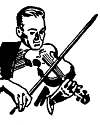|
|
|
4. Research is a State of Mind
A Radio Talk by Charles F. Kettering
 Every time I have the good fortune of being in the studio audience at
Radio City I am impressed with the fact that it takes much less energy
to listen to music than to direct or play it. So, while the Maestro and
the orchestra rest for a moment, I will tell you of a simple
comparison between Music and Research that we have used many times.
Every time I have the good fortune of being in the studio audience at
Radio City I am impressed with the fact that it takes much less energy
to listen to music than to direct or play it. So, while the Maestro and
the orchestra rest for a moment, I will tell you of a simple
comparison between Music and Research that we have used many times.
 This afternoon we are listening to the compositions of Mozart. He was
one of those rare and talented individuals who had the natural
gifts of both composition and execution. He was a child prodigy. This
type of individual is rare but each generation may produce one or
more - they occur not only in the musical field but also in art,
medicine
and science, and their contributions are of great importance. Most of
our work, however, must be done by people with just ordinary abilities
in the beginning who reach positions of skill or responsibility by
practice, study and plain persistence.
This afternoon we are listening to the compositions of Mozart. He was
one of those rare and talented individuals who had the natural
gifts of both composition and execution. He was a child prodigy. This
type of individual is rare but each generation may produce one or
more - they occur not only in the musical field but also in art,
medicine
and science, and their contributions are of great importance. Most of
our work, however, must be done by people with just ordinary abilities
in the beginning who reach positions of skill or responsibility by
practice, study and plain persistence.
Now, I don't know the individual histories of
the men in this orchestra but I suspect the majority of them are here
as the result of arduous practice and much hard work and, in many
cases, sacrifices of many kinds. This Symphony Orchestra is a body of
men, who, in order to perform superbly as a group, must first be
able to perform equally well as individuals. Just organizing
a group of poor musicians doesn't make a good orchestra.
|
|